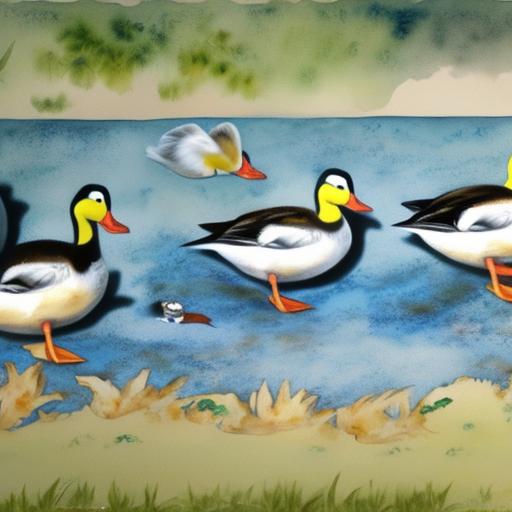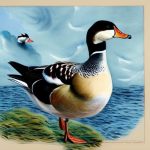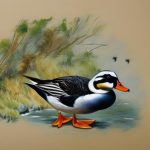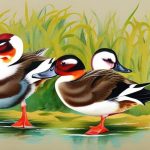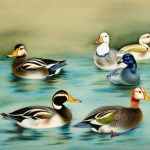Ducklings are undeniably one of the cutest creatures on the planet. From the moment they hatch, they captivate our hearts with their fluffy down, tiny beaks, and waddling walk. The adorable duckling stage is a time of rapid growth and development, as they transition from helpless hatchlings to independent and curious young ducks. During this stage, ducklings are highly dependent on their caregivers for warmth, food, and protection. They spend much of their time exploring their surroundings, learning to swim, and developing their social skills within their flock. This stage is a critical period for imprinting, as ducklings form strong bonds with their human caregivers and fellow ducklings. It’s a time of wonder and joy as we witness these endearing creatures grow and thrive.
As ducklings grow, they undergo a remarkable transformation. Their downy feathers give way to sleek plumage, and their once tiny peeps turn into the familiar quacks of adult ducks. The adorable duckling stage is fleeting, but the memories of their sweet antics and innocent charm will last a lifetime. It’s a time to cherish and celebrate the beauty of new life and the wonder of nature’s miracles.
Key Takeaways
- Ducklings are incredibly adorable and endearing during their early stage of life, making them a popular choice for many people.
- Popular breeds of ducklings include Pekin, Mallard, Khaki Campbell, and Runner, each with their own unique characteristics and traits.
- When choosing the right breed of duckling for you, consider factors such as space, climate, and intended purpose, whether for eggs, meat, or companionship.
- Caring for ducklings involves providing a warm and safe environment, proper nutrition, and regular grooming and hygiene maintenance.
- Ducklings exhibit social behaviors and require proper socialization to thrive, including interaction with humans and other ducklings.
Popular Breeds of Ducklings
There are numerous breeds of ducklings, each with its own unique characteristics and traits. Some of the most popular breeds include the Pekin, Mallard, Khaki Campbell, Runner, and Rouen. Pekin ducklings are known for their white plumage and friendly disposition, making them a popular choice for backyard flocks. Mallard ducklings, with their striking markings and wild nature, are a favorite among waterfowl enthusiasts. Khaki Campbell ducklings are prized for their prolific egg-laying abilities and calm demeanor, making them an excellent choice for those interested in raising ducks for eggs. Runner ducklings are known for their upright posture and comical gait, while Rouen ducklings boast beautiful plumage reminiscent of the wild Mallard.
Each breed of duckling has its own unique set of characteristics, including size, coloration, temperament, and egg-laying capabilities. When choosing a breed of duckling, it’s important to consider your specific needs and preferences, as well as the climate and environment in which they will be raised. Whether you’re interested in raising ducks for eggs, meat, pest control, or simply as beloved pets, there’s a breed of duckling that’s perfect for you.
Choosing the Right Breed for You
When it comes to choosing the right breed of duckling for you, there are several factors to consider. First and foremost, it’s important to think about your specific goals and intentions for raising ducks. Are you primarily interested in raising ducks for eggs, meat, pest control, or companionship? Different breeds have different strengths and characteristics that make them better suited for certain purposes. For example, if you’re looking for prolific egg layers, Khaki Campbell or Indian Runner ducklings may be the best choice for you. On the other hand, if you’re interested in raising ducks for meat production, Pekin or Muscovy ducklings may be more suitable options.
Another important consideration when choosing the right breed of duckling is the climate and environment in which they will be raised. Some breeds are better adapted to cold weather, while others thrive in warmer climates. It’s essential to select a breed that is well-suited to your local climate to ensure the health and well-being of your ducklings. Additionally, it’s important to consider the space available for raising ducks, as some breeds require more room to roam than others.
Ultimately, the right breed of duckling for you will depend on your specific needs, preferences, and circumstances. Whether you’re looking for high egg production, excellent foraging abilities, or friendly disposition, there’s a breed of duckling that’s perfect for you.
Caring for Ducklings
Caring for ducklings requires careful attention to their basic needs, including warmth, food, water, and shelter. From the moment they hatch, ducklings rely on their caregivers to provide a safe and nurturing environment for their growth and development. One of the most critical aspects of caring for ducklings is ensuring they have access to a warm and dry brooder. Ducklings are particularly sensitive to temperature fluctuations and require a consistent source of warmth to thrive. A heat lamp or brooder heater can provide the necessary warmth to keep ducklings comfortable and healthy.
In addition to warmth, ducklings require a balanced diet to support their rapid growth and development. A high-quality starter feed specifically formulated for waterfowl should be provided to meet their nutritional needs. Fresh water should be available at all times, either in a shallow dish or waterer designed for young ducklings. It’s important to monitor their food and water intake regularly to ensure they are receiving adequate nutrition.
As they grow, ducklings will also need access to outdoor space where they can exercise and explore. A secure outdoor enclosure or access to a pond or water source is essential for their physical and mental well-being. Providing ample space for ducklings to roam and forage is crucial for their overall health and happiness.
Duckling Behavior and Socialization
Ducklings are social creatures that thrive in the company of their own kind. From an early age, they form strong bonds with their flock mates and human caregivers. Socialization is an essential aspect of raising healthy and well-adjusted ducklings. It’s important to provide ample opportunities for ducklings to interact with each other and with humans to promote positive social behaviors.
Ducklings are naturally curious and playful, often engaging in activities such as splashing in water, chasing insects, and exploring their surroundings. They are also highly vocal creatures, communicating with each other through a variety of peeps, chirps, and quacks. Observing their interactions with each other can provide valuable insights into their social dynamics and behaviors.
As they mature, ducklings will establish a pecking order within their flock, with dominant individuals asserting their authority over subordinate members. It’s important to monitor their interactions to ensure that aggressive behaviors are kept in check and that all members of the flock are able to coexist peacefully.
Duckling Health and Wellness
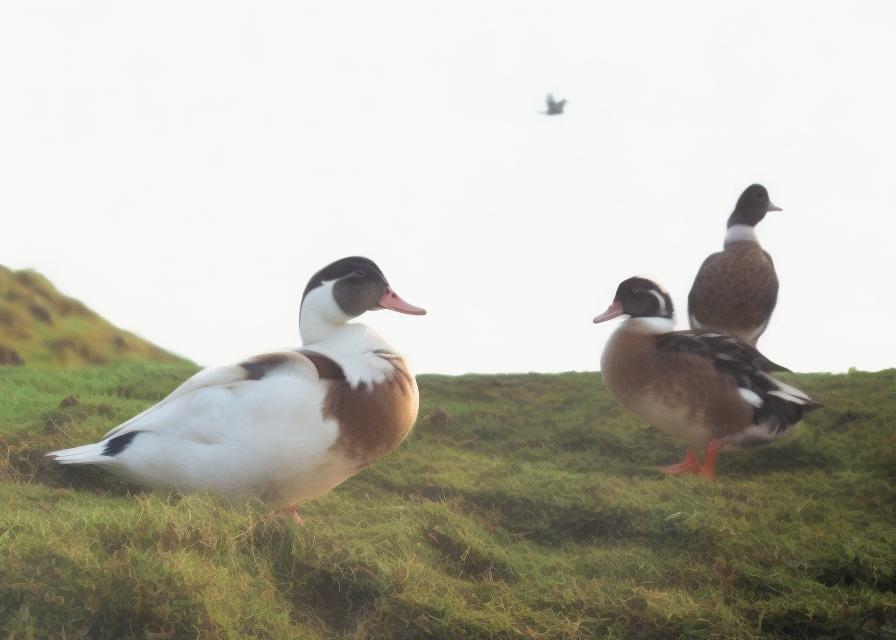
Maintaining the health and wellness of ducklings is essential for their long-term well-being. Regular health checks should be conducted to monitor their growth and development and identify any potential issues early on. It’s important to be vigilant for signs of illness or injury, such as lethargy, loss of appetite, abnormal droppings, or respiratory symptoms.
In addition to regular health checks, providing a clean and sanitary living environment is crucial for preventing disease and promoting good health. Ducklings should have access to clean water for drinking and bathing, as well as a dry and comfortable living space free from drafts and dampness.
Proper nutrition is also key to supporting the health and wellness of ducklings. A balanced diet that meets their specific nutritional needs is essential for promoting healthy growth and development. It’s important to provide access to fresh water at all times and feed them a high-quality starter feed formulated for waterfowl.
Fun Facts about Ducklings
Ducklings are full of surprises and fascinating quirks that make them truly remarkable creatures. Did you know that ducklings are born with an instinctual ability to swim? Within hours of hatching, they can paddle around in water with remarkable agility. This remarkable adaptation helps them evade predators in the wild and makes them well-suited for life on the water.
Another fun fact about ducklings is that they have a specialized oil gland near the base of their tail that produces waterproofing oil. This oil helps keep their feathers dry when they swim and protects them from becoming waterlogged.
Ducklings are also highly adaptable creatures that can thrive in a variety of environments, from urban parks to rural ponds. They are excellent foragers with a keen eye for spotting insects, small fish, and aquatic plants.
In addition to their remarkable physical abilities, ducklings are also highly intelligent animals with complex social behaviors. They form strong bonds with their flock mates and human caregivers and are capable of learning through observation and experience.
In conclusion, ducklings are truly remarkable creatures that captivate our hearts with their adorable antics and endearing charm. From their early days as fluffy hatchlings to their transformation into sleek young ducks, they bring joy and wonder into our lives. By understanding their unique needs and behaviors, we can provide them with the care and attention they need to thrive. Whether you’re interested in raising ducks for eggs, meat, pest control, or simply as beloved pets, there’s a breed of duckling that’s perfect for you. With proper care and attention, ducklings can grow into healthy and happy adult ducks that bring joy and fulfillment into our lives.
If you’re considering raising ducklings, it’s important to understand the different breeds of ducks and their specific needs. Whether you’re interested in raising them for eggs, meat, or as pets, knowing the characteristics of each breed can help you make an informed decision. Understanding the various breeds can also help you create a suitable environment for them to thrive. For more information on hatching eggs naturally and creating a suitable coop for your poultry, check out this helpful article on how long it takes for chicken eggs to hatch naturally.
FAQs
What are the most common breeds of ducks as ducklings?
Some of the most common breeds of ducks as ducklings include Pekin, Khaki Campbell, Rouen, and Mallard.
What are the characteristics of Pekin ducklings?
Pekin ducklings are known for their white feathers, orange bills, and friendly disposition. They are a popular choice for meat production and are also commonly kept as pets.
What are the characteristics of Khaki Campbell ducklings?
Khaki Campbell ducklings are known for their khaki-colored feathers and their excellent egg-laying abilities. They are a popular choice for backyard egg production.
What are the characteristics of Rouen ducklings?
Rouen ducklings are known for their striking plumage, which resembles that of the Mallard duck. They are often kept for ornamental purposes and as pets.
What are the characteristics of Mallard ducklings?
Mallard ducklings are known for their distinctive markings and their wild nature. They are the ancestors of many domestic duck breeds and are often found in the wild.
Meet Walter, the feathered-friend fanatic of Florida! Nestled in the sunshine state, Walter struts through life with his feathered companions, clucking his way to happiness. With a coop that’s fancier than a five-star hotel, he’s the Don Juan of the chicken world. When he’s not teaching his hens to do the cha-cha, you’ll find him in a heated debate with his prized rooster, Sir Clucks-a-Lot. Walter’s poultry passion is no yolk; he’s the sunny-side-up guy you never knew you needed in your flock of friends!

